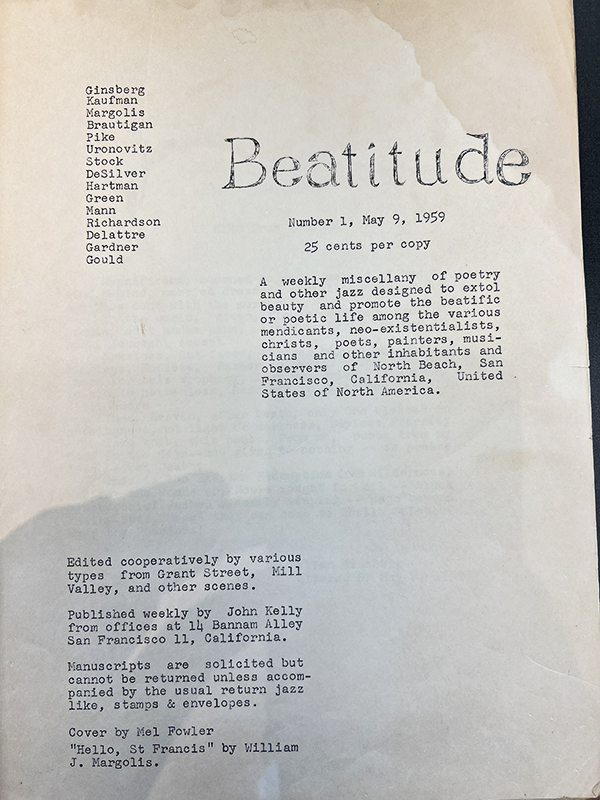April is National Poetry Month! Emory is home to the Raymond Danowski Poetry Library, which houses a collection of over 75,000 volumes of rare and first editions of modern and contemporary poetry. Within the Danowski collection are issues of Beatitude, a Beatnik-era “little” magazine first published in 1959. The magazine featured a number of works from now-famous Beat writers such as Jack Kerouac, Michael McClure, and Lenore Kandel, among many others.
To read Beatitude is to take a furtive glimpse into the literary underground of the late 1950s and early 1960s. The first issues look and feel more like a modern-day zine than what we might think of as a magazine. While the copies housed in the Danowski are in excellent condition, they are printed on cheap paper, and the cover of every issue features a hand-drawn sketch on copy paper of varying colors.
Each first page lists contributors, cover artists, editor(s), cost per copy (usually 25 or 30 cents), and mission statement. While it contained the work of many famous writers, the ethos of Beatitude was not to promote the works of the most famous Beatnik poets. Rather, it called upon poets from all corners of the movement to explore the very essence of what it meant to be Beat. Beatitude’s mission reads as follows:
“A weekly miscellany of poetry and other jazz designed to extol beauty and promote the beatific or poetic life among the various mendicants, neo-existentialists, christs, poets, painters, musicians and other inhabitants and observers of North Beach, San Francisco, California, United States of North America.”
Editorially speaking, Beatitude was a collaborative project with significant editorial guidance—as well as contributions—from the likes of Allen Ginsberg, William J. Margolis, and Bob Kaufman, all of whom contributed frequently to the magazine. Indeed, Kaufman’s surrealist poem “The Abomunist Manifesto” (along with several iterations in subsequent issues) debuted in the first issue of the magazine.
Publications like Beatitude were known as “little” magazines because they were printed cheaply in limited runs and tended to print avant-garde works for small audiences. In the case of Beatitude, only around 1,000 copies of each issue were printed. Publications like this existed because of easy access to mimeograph machines, which allowed for the cheap publication of small books, chapbooks, and magazines. This meant that artists and writers could publish their work without having to go through traditional publishing houses. As such, Beatitude was printed on a mimeograph machine and stapled together by hand.
The first issue was compiled and published on May 9, 1959. The magazine ran weekly for five weeks, then monthly until November 1960. It was revived in 1966, after which it was sporadically published by different editors.
Because relatively few copies of Beatitude were printed, issues of the magazine are a somewhat rare archive. According to WorldCat, as of 2023, only 58 libraries in the United States own issues of Beatitude, and of those just over half own the entire run of the publication. Despite its short tenure as a magazine, Beatitude is a significant artifact of literary history. Beat scholar Nancy Grace notes that Beatitude was “the most important Beat-associated little magazine out of San Francisco in the late 1950s.”
Beatitude can be found in the closed stacks of the Stuart A. Rose Library.
—
References
Belletto, Steven. “The Beats: A Literary History,” Cambridge University Press, 2020.
Grace, Nancy. “The Beats: A Teaching Companion,” Clemson University Press, 2021.
Raskin, Jonah. “American Scream: Allen Ginsberg’s Howl and the Making of the Beat Generation,” University of California Press, 2004.
Weidman, Rich. “The Beat Generation FAQ : All That’s Left to Know About the Angelheaded Hipsters,” Backbeat, 2015.
— Hannah C. Griggs, Emory Libraries visiting subject librarian for English



Beatitude is still being published!!! Latest issue currently being readied for printer and edited by Fanny Renoir. There is no ‘central office’ so to just dismiss it using ‘was’ is irresponsible at best. you are dimissed!